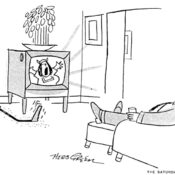I have a bone to pick with psychologists or marriage counselors or whatever you want to call them who advise couples never to go to bed angry. Don’t let things fester is their logic. Attack all disputes immediately. Work the little things out before they become big things.
Let’s say you and your better half were out to an office party, and she reveals when you get home that, in her opinion, you devoted a little too much attention to Ms. Smith, that long-legged, er, tramp (her word) from accounting. You, the accused, feel it was an innocent conversation, and are also tired and wish nothing more than to sleep. But the aggrieved party is wide awake and accusing and wants to work this out. Tonight.
According to the experts, tired or not, you should splash your face with cold water and patiently listen to the full catalogue of your transgressions. Failing to address the matter at hand could create a small rift in your relationship, they say. Further problems will turn the minor rift into a major rent. And then, one day, that rent bill is gonna come due.
The problem with this theory is that problems can’t be solved unless both parties are in the mood to solve them. If you’re not really ready to “have a talk” at that particular moment, the conversation isn’t going to be productive.
My experience is that after a good night’s sleep, whichever one of you was ticked off will have a clearer perspective on the whole messy business. After all, was it really such a big deal? Maybe you were making sure Ms. Smith had properly filed the papers for your annual bonus, which you were going to use to take your wife on that vacation you’d both been talking about. Or maybe you were flirting a little bit. Either way, you can work it out in the light of day.
To be clear, I’m not saying you should sweep problems under the rug. In fact, it’s important, when marriage disputes arise late at night, to make a firm promise to your partner that you’ll address the situation fully. And soon. But not tonight.
Get some sleep!
—Jorge Jetsohn
*“Contrariwise,” continued Tweedledee, “if it was so, it might be; and if it were so, it would be; but as it isn’t, it ain’t. That’s logic.”
This article is featured in the May/June 2017 issue of The Saturday Evening Post. Subscribe to the magazine for more art, inspiring stories, fiction, humor, and features from our archives.
Become a Saturday Evening Post member and enjoy unlimited access. Subscribe now



